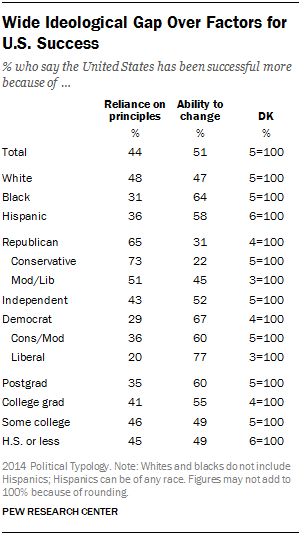Report: Politics, Racial Demographics Shape How We View America's Success

A Pew Research study released on July 3 has found that Americans are sharply divided on what they see as the key to America's success -- and that divide falls roughly along racial and political demographics.
Americans are well-known for their sense of patriotism. A 25-year Pew study found that over 85 percent of respondents each year agreed with the statement, "I am very patriotic," which is an overwhelmingly consistent level of agreement in what seems to be a polarized and divided country.
While we tend to see ourselves as patriotic, we don't always agree that others are as patriotic. When Rudy Giuliani stated that he didn't think President Obama loved America, he definitely wasn't alone in the sentiment. A week later, the Washington Times published a poll that showed that 35 percent of voters agreed with Giuliani's statement.
This new Pew study reveals the underlying reasons for a partisan divide over patriotism: we don't agree on what makes America great.
When given the choice between "reliance on principles" or the "ability to change" as the reason for America's success, answers fell largely along party lines, but it also fell sharply along racial demographics.
Among the parties, this shouldn't be a huge shock -- the classical definitions of conservatism and liberalism are defined by adherence versus change. Independents were less polarized, yet still went with "ability to change" by a 9-point margin.
Racial minorities were more likely to choose "ability to change" as the reason for American success, while whites were almost evenly split in opinion.
What This Means for 2016
Without the wrangling and name-calling of "tinman" conservatives or "strawman" liberals, America is becoming more polarized to the true meanings of the terms.
In the 1970s, there was considerable overlap in ideologies between the two parties in Congress, with liberal Republicans and conservative Democrats. But today, the most conservative Democrat isn't even remotely near the most liberal Republican in ideology.
Four primary factors will probably decide the 2016 presidential race in the battleground states; namely, which party can capture the swing voters, the center, independents, and the Hispanic vote.
Billions of dollars will be spent on trying to win over these crucial votes -- or exasperate them to the point of staying home. Democrats typically fare better with larger voter turnout, and one of the most amazing side-effects of negative advertising is the level of voter disengagement from the entire process, which in turn tends to benefit Republican candidates.
With 45 percent of the electorate self-describing themselves as independent, the parties are going to have their work cut out for them winning this segment of the electorate over to their side.
A blood-bath of negative campaigning like we saw in 2014 might just backfire -- the campaigns are going to need real dialog and real answers to the problems America faces, not just finger-pointing and "gotcha" political ads.
The Democratic strategists and candidates have wholly embraced their new progressive-style of politics, and are rapidly defining themselves to the voters -- they are taking a huge gamble, as not all Democrats are sure of how "embraceable" this new strategy will be.
Republicans, with so many candidates vying for position, have still not defined themselves to the voters, and it is unlikely that this will rapidly develop until several candidates drop out of the race.
The key to both parties is how to be the party of inclusion -- not excluding voters who are on the "fringe" of party ideology.
A huge part of being the party of inclusion will be the ability of each party to win over the electorate on what direction the federal courts should be taking, including SCOTUS nominations. But this, as President George W. Bush found out, is no certainty. Even the most party faithful can become a wild-card swing vote on the high court.
But the most interesting result of all of this is that 2016 could become an election fought on ideas and ideals, battled out in meaningful dialog and debate, something that hasn't happened in America in decades.
Photo Credit: Prixel Creative / shutterstock.com




